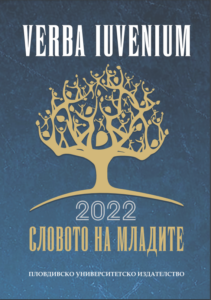Contents of Issue 4
Foreword
I. Linguistics
Gergana Georgieva
Radostina Koleva
On the Question of the Gender Defectivity of the So Called Collective Nouns
Diana Markova
Vasil Stamenov
Observations on the Functioning of the Peripheral Evidential Modifiers in Modern Bulgarian
Krasilina Koleva-Kostova
On the Scope and Depth in the Complex Compound Sentence – Parallel Observations
Zhaneta Andreeva
Methods for Identification of Cognitive Metaphors in Political Speech
Desislava Dimitrova
Sema Kutsarova
Word Formation Models of Deverbal Nouns Nomina Professionalis in Turkish and Bulgarian Language
Polina Tabakova
Simona Haltakova
Retelling in Modern Bulgarian and Its Functional Equivalents in English
Radoslava Koleva
A White Slave or a Victim of a Human Trafficking – a Language Depiction of a Certain Crime
Evgenia Miteva
Jelena Pavlović Jovanović
The Subordinate Clause in Grammars from the 19th Century
Viktoriya Ivanova
A Look at a Popular Psycholinguistic Experiment
Nataliya Matseva
Daniela Ivanova
Corpus Approach in the Study of the Language Deviations in Bulgarian as a Foreign Language
II. Literary Studies
Svetoslav Stoychev
Text and Image – Bruegel and “Metamorphoses”
Joanna Neykova
The Romantic Fragment and the Fragmentary Mode of Writing
Barbara Miteva
Who are you?: Alice on a Journey to Her Self
Ivan Georgiev
Hetaera Esmeralda. The Disease Cipher in “Doctor Faustus” (Thomas Mann)
Dimitar Karamitev
Photographic Sensibilities in Two Early Novels by Thomas Hardy
Francheska Zemyarska
The Tenth Mask in the Structure of “Fires”
Venesa Nacheva
The Ideology of Otherness: The Image of the Mother in the Poetry of Eugeniusz Tkaczyszyn-Dycki
Nedyalko Zhelev
The Past and Present in the (Anti)military Novels of Josip Mlakić
Monika Galabova
Fiction and/or Reality. Critical Readings of the Sinistra Zone by Ádam Bodor
Yves-Christian Angelov
Simona-Aleks Mihaleva
Iva Stefanova
The Utopian Space of the Kunstkammer
Simeon Ganev
The Film Genre Situation Comedy. Genre Characteristics and Challenges for the Translator
Svidna Mihaylova
Analysis of Two Bulgarian Translations of the Poem “Don Quixote” by Dmitry Merezhkovsky
Ivana Vitanova
“Ti sne ot nebesata plamak…” – the Prometheus Complex and Pencho Slaveykov’s Works
Iliyan Karaboychev
(Pre)knowledge – a Curse and/or Mission in Atanas Dalchev and Dimitar Pantaleev`s Poetry
Iliya Tochev
